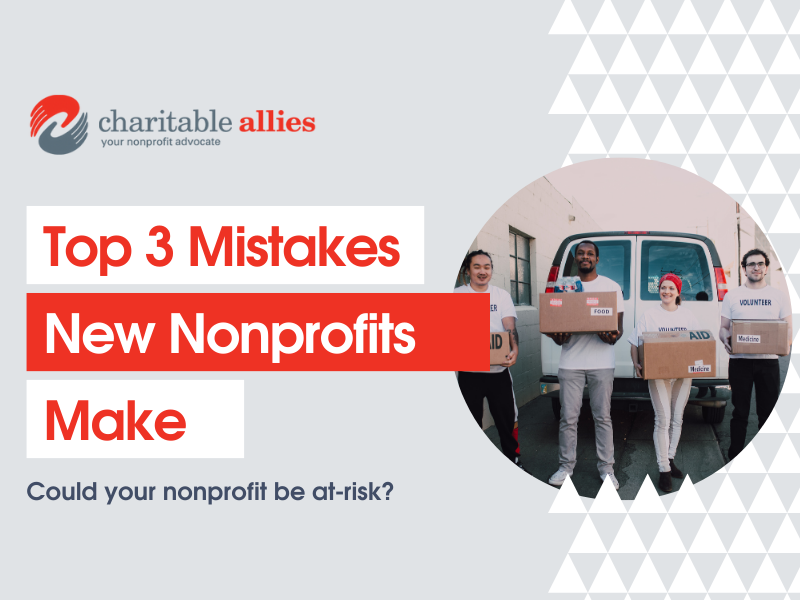
Starting a nonprofit can be a fulfilling experience that allows you to pursue a cause you’re passionate about. However, many new nonprofit founders don’t anticipate the challenges that arise from starting a nonprofit. There are three common mistakes new nonprofit leaders make that can cost your charity time, money, or even put the organization at-risk legally.
1. Missing out on additional tax exemptions and discounts
While most new nonprofits focus on getting their tax exempt status from the IRS at first, they don’t realize that many states have additional forms you’ll need to complete in order to be exempt from different types of taxes, like sales tax, state income tax or property tax. Many times these are short, easy forms that can save your nonprofit money so you can put more funding toward your mission. We delve further into details in our article about obtaining additional tax exemptions for your nonprofit.
New nonprofits also miss out on discounts that are available to 501c3 organizations. Both local and national companies often offer a nonprofit discount, but you’ve got to look for it or ask! We’ve compiled a list of 10 ways to save your nonprofit money to help you find a few of our favorite discounts for nonprofits.
2. Not checking your state’s requirements to start fundraising
Each state handles fundraising differently, but 43 of them require some sort of registration to be able to fundraise legally in that state. The only states that currently don’t require Charitable Solicitation Registration are Indiana, Idaho, Delaware, Nebraska, South Dakota, Vermont, and Wyoming. And some states like Arizona only require certain types of nonprofit organizations to register. You’ll need to follow the requirements for each state you’re looking to fundraise in if you want to fundraise in multiple states. NASCO has a useful chart that can tell you a little more about what the requirements are for your state to help you get started. Note that many states require nonprofits to register upfront and/or provide an annual report with information about your fundraising efforts.
3. Not understanding how a nonprofit is allowed to make money
While most people know that nonprofits can fundraise through grants, individuals, and companies. Many people don’t fully understand that there are many more ways for a nonprofit to legally earn money. Nonprofits can make program service revenue, which is when the nonprofit charges for a service that is related to its mission. Examples of this are a school charging students tuition or an animal shelter charging an adoption fee. There are complex laws surrounding how nonprofits are legally allowed to make money, so please reach out to us if you have specific questions on that topic.
As a nonprofit ourselves, we know there are unique challenges to creating and running a thriving charity. If you’d like more assistance and education about your nonprofit’s compliance concerns, request a consultation to learn more or check out our free checklist for next steps for new nonprofit organizations.

